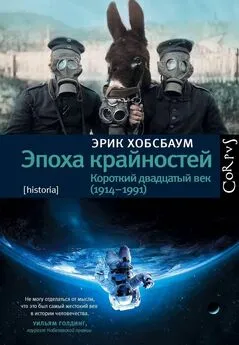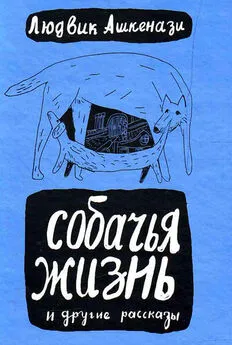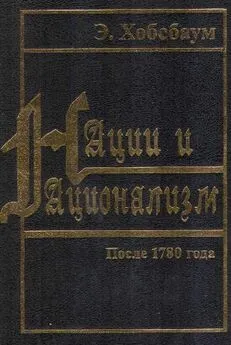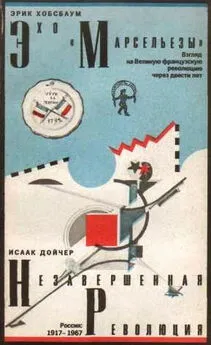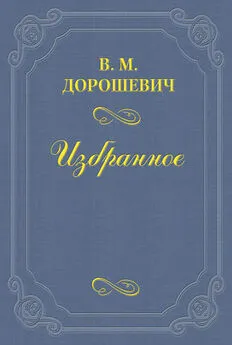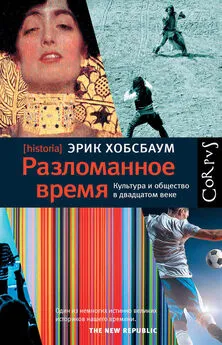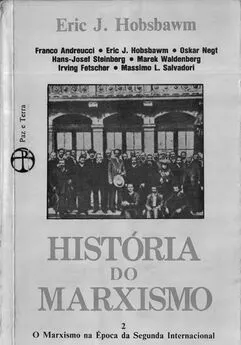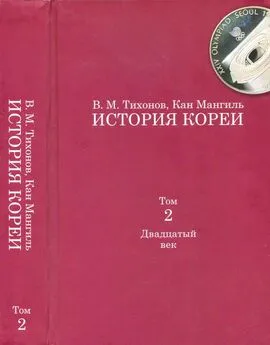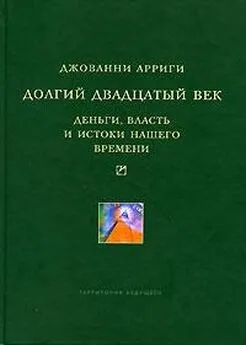Эрик Хобсбаум - Эпоха крайностей. Короткий двадцатый век (1914–1991)
- Название:Эпоха крайностей. Короткий двадцатый век (1914–1991)
- Автор:
- Жанр:
- Издательство:Литагент Corpus
- Год:1994
- ISBN:978-5-17-090322-1
- Рейтинг:
- Избранное:Добавить в избранное
-
Отзывы:
-
Ваша оценка:
Эрик Хобсбаум - Эпоха крайностей. Короткий двадцатый век (1914–1991) краткое содержание
Хобсбаум делит короткий двадцатый век на три основных этапа. “Эпоха катастроф” начинается Первой мировой войной и заканчивается вместе со Второй; за ней следует “золотой век” прогресса, деколонизации и роста благополучия во всем мире; третий этап, кризисный для обоих полюсов послевоенного мира, завершается его полным распадом. Глубокая эрудиция и уникальный культурный опыт позволяют Хобсбауму оперировать примерами из самых разных областей исторического знания: истории науки и искусства, экономики и революционных движений. Ровесник века, космополит и коммунист, которому тяжело далось прощание с советским мифом, Хобсбаум уделяет одинаковое внимание Европе и обеим Америкам, Африке и Азии.
Ему присущ дар говорить с читателем на равных, просвещая без снисходительности и прививая способность систематически мыслить. Трезвый анализ процессов конца второго тысячелетия обретает новый смысл в начале третьего: будущее, которое проступает на страницах книги, сегодня стало реальностью. “Эпоха крайностей”, увлекательная и поразительно современная книга, – незаменимый инструмент для его осмысления.
Эпоха крайностей. Короткий двадцатый век (1914–1991) - читать онлайн бесплатно полную версию (весь текст целиком)
Интервал:
Закладка:
Holland, 1985: R. F. Holland, European Decolonization 1918–1981: An introductory survey . Basingstoke, 1985.
Holman, 1993: Michael Holman, New Group Targets the Roots of Corruption // Financial Times. 1993. May 5.
Holton, 1970: G. Holton, The Roots of Complementarity // Daedalus. 1978. Autumn. P. 1017.
Horne, 1989: Alistair Horne, Macmillan, 2 vols. London, 1989.
Housman, 1988: A. E. Housman, Collected Poems and Selected Prose (edited and with an introduction and notes by Christopher Ricks). London, 1988. [Хаусман А. Избранные стихотворения . М.: Водолей Publishers, 2006.]
Howarth, 1978: T. E. B. Howarth, Cambridge Between Two Wars . London, 1978.
Hu, 1966: C. T. Hu, Communist Education: Theory and Practice /
R. Mac-Farquhar ed., China Under Mao: Politics Takes Command. Cambridge MA, 1966.
Huber, 1990: Peter W. Huber, Pathological Science in Court // Daedalus. 1990. Autumn. Vol. 119. № 4. P. 97–118.
Hughes, 1969: H. Stuart Hughes, The second year of the Cold War: A Memoir and an Anticipation // Commentary. 1969. August.
Hughes, 1983: H. Stuart Hughes, Prisoners of Hope: The Silver Age of the Italian Jews 1924–1947 . Cambridge MA, 1983.
Hughes, 1988: H. Stuart Hughes, Sophisticated Rebels. Cambridge and London, 1988.
Human Development: United Nations Development Programme (UNDP) Human Development Report. New York, 1990, 1991, 1992.
Hutt, 1935: Allen Hutt, This Final Crisis. London, 1935.
Ignatieff, 1993: Michaei Ignatieff, Blood and Belonging: Journeys into the New Nationalism . London, 1993.
ILO, 1990: ILO Yearbook of Labour Statistics: Retrospective edition on Population Censuses 194 5 –1989. Geneva, 1990.
IMF, 1990: International Monetary Fund, Washington: World Economic Outlook: A Survey by the Staff of the International Monetary Fund, Table 18: Selected Macro-economic Indicators 1950–1988. IMF, Washington, May 1990.
Investing, 1983: Investing in Europe's Future ed., Arnold Heertje for the European Investment Bank. Oxford, 1983.
Isola, 1990: Gianni Isola, Abbassa la tua radio, perfavore. Storia dell'ascolto radiofonico nell'Italia fascista. Firenze, 1990.
Jacobmeyer, 1985: Wolfgang Jacobmeyer, Vom Zwangsarbeiter zum heimatlosen Ausländer: Die Displaced Persons in Westdeutschland, 1945–1951. Gottingen, 1985.
Jacob, 1993: Margaret C. Jacob, Hubris about Science // Contention. 1993. Spring. Vol. 2. № 3.
Jammer, 1966: M. Jammer, The Conceptual Development of Quantum Mechanics . New York, 1966.
Jensen, 1991: K. M. Jensen ed., Origins of the Cold War: The Novikov, Kennan and Roberts ‘Long Telegrams' of 1946, United States Institute of Peace. Washington, 1991.
Johansson/Percy, 1990: Warren Johansson and William A. Percy ed., Encyclopedia of Homosexuality, 2 vols. New York and London, 1990.
Johnson, 1972: Harry G. Johnson, Inflation and the Monetarist Controvery. Amsterdam, 1972.
Jon, 1993: Jon Byong-Je, Culture and Development: South Korean experience, International Inter-Agency Forum on Culture and Development. September 20–22. 1993, Seoul.
Jones, 1992: Steve Jones, review of David Raup, Extinction: Bad Genes or Bad Luck? // London Review of Books. 1992. April 23.
Jowitt, 1991: Ken Jowitt, The Leninist Extinction / Daniel Chirot ed., The Crisis of Leninism and the Decline of the Left . Seattle, 1991.
Julca, 1993: Alex Julca, From the highlands to the city (unpublished paper, 1993). Jünger, 1921: Ernst JÜnger, In Stahlgewittern. Hanover, 1920.
[Юнгер Э. В стальных грозах. СПб.: Владимир Даль, 2000.]
Kakwani, 1980: Nanak Kakwani, Income Inequality and Poverty. Cambridge, 1980. Kapu´szin´ski, 1983: Ryszard Kapu´szin´ski, The Emperor . London, 1983.
[Капущинский Р. Император. Шахиншах . М.: Европейские издания, 2007.]
Kapu´szin´ski, 1990: Ryszard Kapu´szin´ski, The Soccer War. London, 1990.
Kater, 1985: Michael Kater, Professoren und Studenten im dritten Reich // Archiv f. Kultur geschichte. 67/1985. № 2. P. 467.
Katsiaficas, 1987: George Katsiaficas, The Imagination of the New Left: A global analysis of 1968. Boston, 1987.
Keene, 1984: Donald Keene, Japanese Literature of the Modem Era. New York, 1984.
Kelley, 1988: Alien C. Kelley, Economic Consequences of Population Change in the Third World // Journal of Economic Literature. 1988. December. Vol. 26. № 4. P. 1685–1728.
Kerblay, 1983: Basile Kerblay, Modern Soviet Society. New York, 1983.
Kershaw, 1983: Ian Kershaw, Popular Opinion and Political Dissent in the Third Reich: Bavaria 1933–1945. Oxford, 1983.
Kershaw, 1993: Ian Kershaw, The Nazi Dictatorship: Perspectives of Interpretation, 3rd edn. London, 1993.
Khrushchev, 1990: Sergei Khrushchev, Khrushchev on Khrushchev: An Inside Account of the Man and His Era. Boston, 1990.
Kidron/Segal, 1991: Michael Kidron and Ronald Segal, The New State of the World Atlas, 4th ed. London, 1991.
Kindleberger, 1973: Charles P. Kindleberger, The World in Depression 1919–1939. London and New York, 1973.
Koivisto, 1983: Peter Koivisto, The Decline of the Finnish – American Left 1925–1945 // International Migration Review. 1983. Vol. 17. № 1.
Kolakowski, 1992: Leszek Kolakowski, Amidst Moving Ruins // Daedalus. 1992. Spring. Vol. 121. № 2. [цит. по: Колаковский Л. Посреди движущихся руин // Путь. Международный философский журнал. 1993. С. 165–178.]
Kolko, 1969: Gabriel Kolko, The Politics of War: Allied diplomacy and the world crisis of 1943–1945. London, 1969.
Köllö, 1990: Janos KÖllÖ, After a dark golden age – Eastern Europe in WIDER Working Papers (duplicated). Helsinki, 1990.
Kornai: Janos Kornai, The Economics of Shortage. Amsterdam, 1980. [Корнаи Я. Дефицит . М.: Наука, 1990.]
Kosinski, 1987: L. A. Kosinski, review of Robert Conquest, The Harvest of Sorrow: Soviet Collectivisation and the Terror Famine // Population and Development Review. 1987. Vol. 13. № 1.
Kosmin/Lachman, 1993: Barry A. Kosmin and Seymour P. Lachman, One Nation Under God: Religion in Contemporary American Society. New York, 1993.
Kulischer, 1948: Eugene M. Kulischer, Europe on the Move: War and Population Changes 1917–1947. New York, 1948.
Kuttner, 1991: Robert Kuttner, The End of Laisser-Faire: National Purpose and the Global Economy after the Cold War. New York, 1991.
Kuznets, 1956: Simon Kuznets, Quantitative Aspects of the Economic Growth of Nations // Economic Development and Culture Change. 1956. Vol. 5. № 1. P. 5–94.
Ladurie, 1982: Emmanuel Le Roy Ladurie, Paris – Montpellier: PC-PSU 1945–1963. Paris, 1982.
Lafargue: Paul Lafargue, Le droit à la paresse. Paris, 1883; The Right to Be Lazy and Other Studies. Chicago, 1907. [Лафарг П. Право на лень . М.: URSS: Либроком, 2012.]
Land Reform: Philip M. Raup, ‘Land Reform' in art. ‘Land Tenure ' / International Encyclopedia of Social Sciences. Vol. 8. New York, 1968. P. 571–575.
Lapidus, 1988: Ira Lapidus, A History of Islamic Societies. Cambridge, 1988.
Laqueur, 1977: Walter Laqueur, Guerrilla: A historical and critical study. London, 1977.
Larkin, 1988: Philip Larkin, Collected Poems (ed. and with an introduction by Anthony Thwaite). London, 1988.
Larsen E., 1978: Egon Larsen, A Flame in Barbed Wire: The Story of Amnesty International . London, 1978.
Larsen S. et al., 1980: Stein Ugevik Larsen, Bernt Hagtvet, Jan Fetter, My Klebost et al., Who Were the Fascists? Bergen – Oslo – Tromsö, 1980.
Lary, 1943: Hal B. Lary and associates, The United States in the World Economy: The International Transactions of the United States during the Interwar Period, US Dept of Commerce. Washington, 1943.
Las Cifras, 1988: Asamblea Permanente para los Derechos Humanos, Las Cifras de la Guerra Sucia . Buenos Aires, 1988.
Latham, 1981: A. J. H. Latham, The Depression and the Developing World, 1914–1939. London and Totowa NJ, 1981.
League of Nations, 1931: The Course and Phases of the World Depression. Geneva, 1931 (reprinted 1972).
League of Nations, 1945: Industrialisation and Foreign Trade . Geneva, 1945.
Leaman, 1988: Jeremy Leaman, The Political Economy of West Germany 1945–1985. London, 1988.
Leighly/Naylor, 1992: J. E. Leighly and J. Naylor, Socioeconomic Class Bias in Turnout 1964–1988: the voters remain the same // American Political Science Review. 1992. September. Vol. 86. № 3. P. 725–736.
Lenin, 1970: V. I. Lenin, Selected Works in 3 Volumes (Moscow, 1970: ‘Letter to the Central Committee, the Moscow and Petrograd Committees and the Bolshevik Members of the Petrograd and Moscow Soviets', October 1/14 1917, V. I. Lenin op. cit., vol. 2, p. 435; Draft Resolution for the Extraordinary All-Russia Congress of Soviets of Peasant Deputies, November 14/27, 1917, V. I. Lenin, loc. cit., p. 496; Report on the activities of the Council of People's Commissars, January 12/24 1918, loc. cit., p. 546. [цит по: Ленин В. И. Полное собрание сочинений . В 55 томах. 5-е изд. Том 35. М.: Изд-во политической литературы, 1974.]
Leontiev, 1977: Wassily Leontiev, The Significance of Marxian Economics for Present-Day Economic Theory // Amer. Econ. Rev. Supplement. 1938. March 1. Vol. XXVIII; republished in Essays in Economics: Theories and Theorizing, vol. 1, p. 78 (White Plains, 1977).
Lettere: P. Malvezzi and G. Pirelli eds., Lettere di Condannati a morte della Resistenza europea. Turin, 1954. P. 306.
Lévi-Strauss: Claude LÉvi-Strauss, Didier Eribon, De Près et de Loin. Paris, 1988. [Леви-Стросс К., Эрибон Д. Издалека и вблизи . СПб.: Издательство Ивана Лимбаха, 2018.]
Lewin, 1991: Moshe Lewin, Bureaucracy and the Stalinist State (unpublished paper) / Germany and Russia in the 20th Century in Comparative Perspective . Philadelphia, 1991.
Lewis, 1981: Arthur Lewis, The Rate of Growth of World Trade 1830–1973 / Sven Grassman and Erik Lundberg eds., The World Economic Order: Past and Prospects . London, 1981.
Lewis, 1935: Sinclair Lewis, It Can't Happen Here. New York, 1935.
[Льюис С. У нас это невозможно . М.: Художественная литература, Lewontin, 1973: R. C. Lewontin, The Genetic Basis of Evolutionary Change. New York, 1973. [Левонтин Р. Генетические основы эволюции. М.: Мир, 1978.]
Lewontin, 1992: R. C. Lewontin, The Dream of the Human Genome // New York Review of Books. 1992. May 28. P. 32–40.
Leys, 1977: Simon Leys, The Chairman's New Clothes: Mao and the Cultural Revolution. New York, 1977.
Читать дальшеИнтервал:
Закладка:
